Iran & Syria: How Arab and Western countries are shifting posturing toward Damascus
By Elijah J. Magnier
(Magnier is a veteran war correspondent and a senior political risk analyst with decades of experience covering the West Asia region.)
The ripple effects of the Iranian oil tankers taking oil to Lebanon via Syria affected and generously amplified the influence of Hezbollah in Lebanon and reached the US, Russia, and several Arab states. The consequences have hastened important regional and international issues, putting these forcefully on the discussion table and imposing a review of US policy in West Asia, particularly Syria. The Western countries, including the US, began to rethink and contemplate the current reservations about the relationship with Syria and its return to the Arab League and the international community. The goal — or perhaps the wish — is to offer President Bashar al-Assad the opportunity to rethink his global and regional relations and remove Iran and Russia’s exclusive roles in the Levant.
Many events have taken place in West Asia and New York in recent months. The undeclared meetings in Baghdad between Saudi Arabia and Iran, Jordan and Iran, and Egypt and Iran helped break the ice among these regional countries and allowed them to discuss important affairs of great concern. Moreover, the Iraqi summit enabled Saudi Arabia, Qatar, Iran, Kuwait, Egypt, Jordan, and France to meet and warm up their relationship, creating more rapprochement between regional states. Iraq is playing a positive and important role, where all countries can convene and discuss their differences. Also, there were important meetings between Jordanian King Abdullah and US President Joe Biden in Washington and President Vladimir Putin in Moscow, and between Syrian President Bashar al-Assad and President Putin to talk about the unity of Syrian territory. Lastly, there were the expected visits of Turkish President Recep Tayyip Erdogan to Moscow and New York. These meetings open the door to the next stage, which would pave the way for Syria reassuming its position in the regional and international sphere.
Indeed, the most prominent development was the Jordanian king’s declaration from Washington that, “President Bashar al-Assad is staying in power and a way must be found to regain the dialog with him.” This does not mean that Jordan ceased its relationship with Syria in the last decade. The Jordanian Embassy has never closed its doors in Damascus, nor has the Syrian Embassy in Amman, despite Jordan hosting the Military Operation Command (MOC) room. The MOC hosted Arab and Western military commanders, including from the US, to lead sabotage operations and others attacks inside Syria, aiming to end the rule of the Syrian president and create a failed state in Syria. It has supported and trained militants in Jordan, including those of al-Qaeda , to the knowledge of the US’s trainees and administration.
Throughout the decades of war in Syria, contacts between Amman and Damascus at security and political levels did not stop, although they varied in intensity. The last significant official communications were twofold.
The first was a call between Jordanian Interior Minister Mazen al-Faraya and his Syrian counterpart, Muhammad al-Rahmoun. The two ministers said they had agreed to coordinate the transit of trucks between their countries, which means that the US has to exclude Jordan and Syria from the sanctions imposed through the “Caesar Civilian Protection Act.” Syrian trucks will be able to cross the borders without discharging their load into other trucks on the Jordanian side of the border. That will significantly reduce the Syrian cost, open the road to Syrian merchandise reaching many countries, and bring in much-needed foreign currency.
The second high official contact was the visit of Syrian Minister of Defence and Deputy Prime Minister Ali Ayoub to Amman and the meeting with the Jordanian chief of staff, Major General Yousef Al-Hunaiti, the first official meeting at this level after ten years of war in Syria.
There is little doubt that the US opened the door for Syria’s return to Lebanon when it agreed to revive the gas line carrying Egyptian gas via Jordan to Lebanon. This gas line was offered as an alternative in a desperate attempt to limit Iranian diesel and gasoline flowing to Lebanon via Hezbollah. The US ambassador to Lebanon, Dorothy Shea, announced the gas supply decision in reaction to the announcement by Secretary-General of Hezbollah Sayyed Hassan Nasrallah. Sayyed Nasrallah promised to supply the country with Iranian oil through Syria to break the unannounced US blockade and meet the Lebanese people’s needs. Lebanon, thirsty for oil supplies (whose loss has paralysed the cycle of life in the country, which is suffering an unprecedented economic crisis), blessed the Iranian oil as it fell like manna on the Lebanese population. The popularity of Iran and Hezbollah boomed and was hailed by allies, friends and (many) enemies alike.
However, Iranian oil is not the only problem that the US and the Arab countries have to face. They are highly concerned that Syria will remain within the Iranian sphere of influence. Iran gained unprecedented popularity in Syria because of Washington’s policy, which wanted to create a failed state in Syria and remove President Assad from power. Moreover, Iran gathered more kudos when the US was unable to destabilize Syria, Iraq, and Lebanon. The US administration thought that by imposing harsh sanctions on Syria and preventing any rapprochement between Damascus and other regional and Western capitals, it could leverage President Assad, force his hand, and dictate its conditions.
It seems that the Biden administration is beginning to evaluate matters more realistically, as expressed by the Jordanian king after he met with Biden. It is not by coincidence that King Abdullah says from Washington that there is a necessity for Syria’s return and dealings with Assad, a topic that had been taboo under previous US administrations. It is indeed a small but significant step, even if it does not mean that the US will soon warm its relationship with Syria. Instead, the return of the Arab and Western countries’ relationship with Assad is preparation for public opinion to acknowledge that the Syrian president is the elected leader of his country, which the countries involved in the last decade of war with Syria can no longer ignore.
The Syrian president said to his many official regional and Western visitors that, “the US has never severed its security relationship with Syria. However, we in Syria reject any political dialog unless the US-occupied forces withdraw from the northeast active region.”
The US and many European states (France, Italy, Germany, and others) have maintained a security and counter-terrorism relationship with Syria. However, Syria has stipulated that all the European delegations should reopen the doors of their embassies before engaging in political relations. Damascus’ government is stronger today than ever, notably since the south has fully returned to Syrian army control.
Indeed, in recent weeks, Syria liberated Dara’a and Tafas, securing more than 328 kilometres starting from the Badia to As-Suwayda and Dara’a. A few days ago, all cities in the Huran area fell under the Syrian army’s control. A large part of the south of Syria was under rebels, who coexisted with the Syrian military, following a deal stipulated by Russia in 2018. These militants created a “buffer zone,” controlling the border crossing with Jordan and protecting the Israelis, who occupy the Syrian Golan Heights and Israeli borders. The Israelis repeatedly said they feared the presence of Hezbollah and Iran on the Syrian borders and failed to impose a zone free of the Iranian presence wherever the Syrian leadership wished it to be.
However, Russian Foreign Minister Sergei Lavrov said, “Russia will not accept that Syria is used as a platform for operations against Israel.” Thus, Russia is sending the message to the US and Israel that the Syrian forces on the Syrian borders are a guarantor of Israel’s protection and an indication to Iran that Moscow wishes for the occupied Golan Heights front to remain cold.
Lavrov is undoubtedly expressing Russia’s concern over Israel’s safety and security and is offering Moscow’s guarantee to prevent attacks against the occupied Golan Heights. Nevertheless, Russia did not stop Israel from violating Syrian sovereignty and territory. Indeed, Israel carried out over a thousand attacks, violating Syrian sovereignty, killing many civilians, and destroying many positions and warehouses belonging to the Syrian state. Moscow offered the Syrian army surface-to-air missiles to intercept the Israeli aggressive and repetitive attacks but failed to stop these attacks even when Israel was responsible for downing the Il-20 aircraft and killing 15 Russian service members.
Russia has been present in the south since 2018, following a deal between local militants and the Syrian government. This deal is no longer necessary because the forces of Damascus took complete control of the south of Syria. Moreover, Russia can’t prevent Syria from liberating its territory (the Golan Heights) when the central government decides to do so at any time in the future.
Undoubtedly, the Iranian influence and military presence in Syria were consequences of the global war against Syria and its request to Iran for support. Even if the US is preventing Middle Eastern countries from re-establishing ties with Syria, Damascus shows a willingness to open a new page with Western and Arab countries. Therefore, the US is the main contributor to the increasing Iranian influence in the Levant when the Islamic Republic is Syria’s leading supporter and supplier of first necessities.
The US may be trying to compensate by reviewing its position on Syria and its self-violation of “Caesar’s Law” to create new balances in the region and allow the Arab League to include Damascus again. During the recent summit in Baghdad, the French President Emmanuel Macron promised the Iraqi Prime Minister Mustafa al-Kadhemi to look into the EU relationship with Assad. Al-Kadhemi briefed President al-Assad in a 20-minute private telephone conversation immediately after the conference ended, sources in al-Kadhemi’s office told me.
The return of the official Jordanian-Syrian relationship is related to border security, preventing old and new smuggling roads between the two countries, and combating terrorism. Jordan is taking the lead as a pioneer in opening the door for other Middle Eastern countries to go through it and allow the US administration to prepare its future policy to enable Syria to return to the regional and international platforms and no longer be isolated. This is not going to happen very soon. However, it is the beginning of a fundamental position shift toward Syria.
The international community will have no choice but to embrace Syria, the sooner the better, before the nuclear deal with Iran is implemented and when all sanctions are lifted. When this happens in the coming months, Iran is expected to become much stronger financially and enjoy unprecedented economic and financial power. Its support to Syria will be much more significant, rendering the US-EU embargo useless and ineffective.
The Iranian oil tanker docked in Syria, and the gas oil was transported to Lebanon, just as Hezbollah's balance-breaking weapons supply does. The Iranian presence in Quneitra also worries Israel and the US and challenges the Israeli occupation of the Syrian Golan. In addition, the Syrian war is coming to an end with the liberation of the territories occupied by the US-Turkish forces in the north. The US forces will leave sooner or later, causing severe concern to the Kurdish forces in that northeast part of the country.
Indeed, the representative of the “Syrian Democratic Council” (the force that protects the US occupation forces) in the United States, Bassam Saqr, said that, “America should warn the Syrian Kurds if the decision to withdraw all forces is taken. The withdrawal, whenever it will happen, must be gradual, step by step.”
A shift in the US policy and its review of the future of its forces occupying the northeast of Syria is to be expected. What raised severe alarms in the US and other Persian Gulf countries is the strength Iran has reached and the power it is enjoying as an unintended consequence of the Syrian war in 2011. It is high time to admit the failure of the US objectives and allow the Syrian economy and its relationship with the rest of the world to blossom. The Syrian-Iranian relationship is strategic and their strong bond is robust enough not to be out at risk notwithstanding the future developments in Syria.
(The views expressed in this article do not necessarily reflect those of Press TV.)
US officials warn of challenges posed by Iranian drones
'We warned repeatedly about the limit to our patience': Hezbollah leader
IRGC announces 'blinding' US, Israel's eye in region; vows harsher retaliation coming
Iraqi resistance leader urges Americans to ‘reclaim’ country from Israeli ‘puppet Trump
Iran blasts US-Israeli use of autonomous killer systems against civilians as 'war crime'
US-Israeli aggression left Tehran with no choice but to defend Itself: President Pezeshkian
Iran urges immediate intl. action against US attacks on schools
Iraq won’t allow terror groups to cross border into Iran: Security official



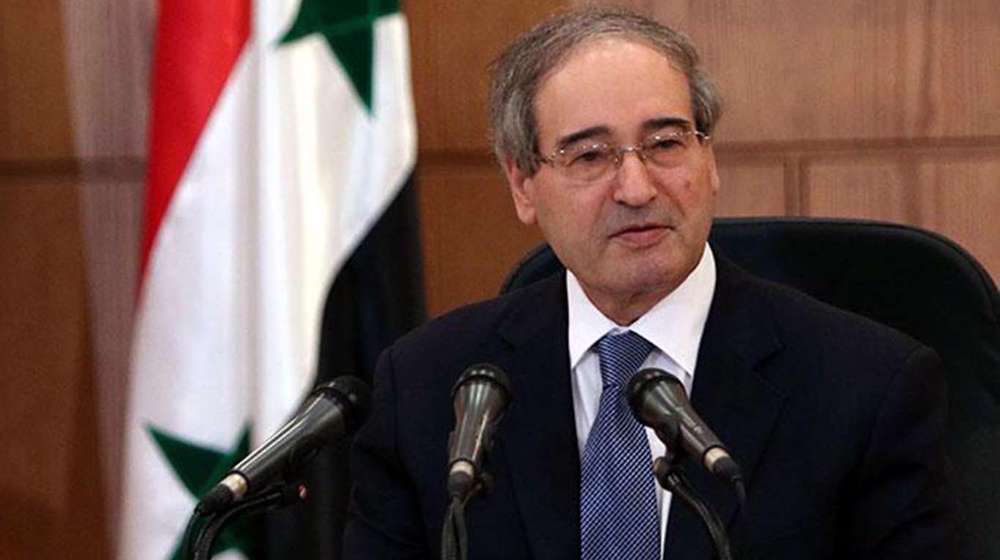
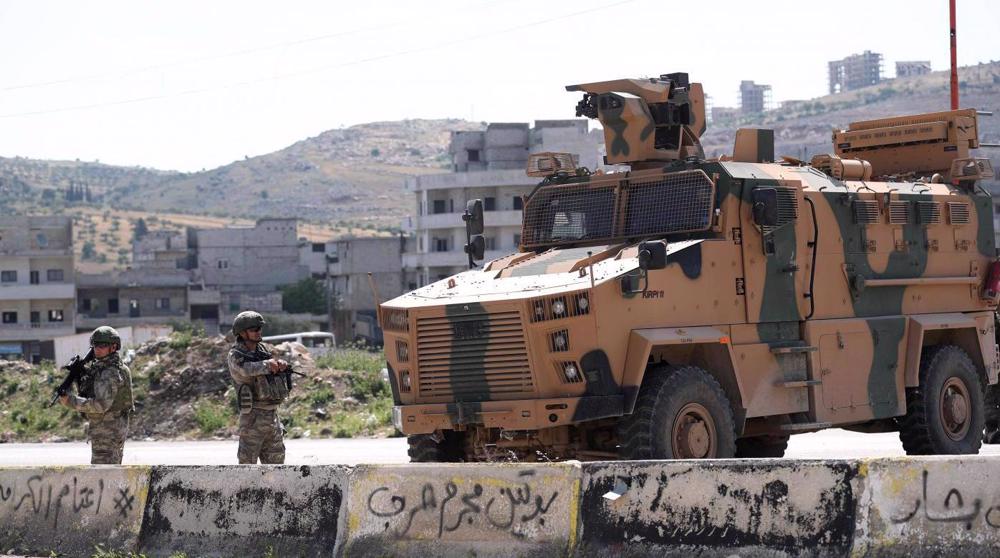
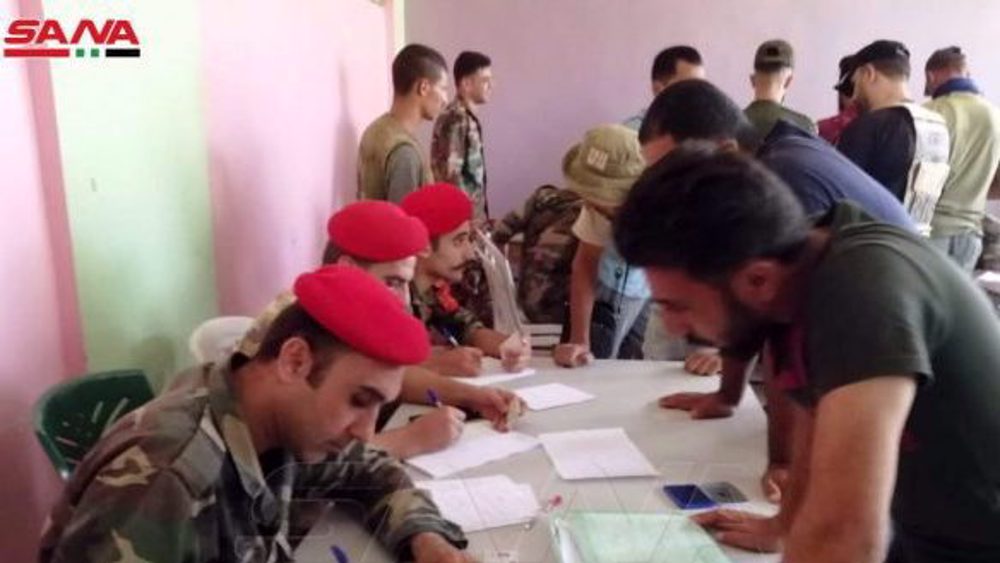
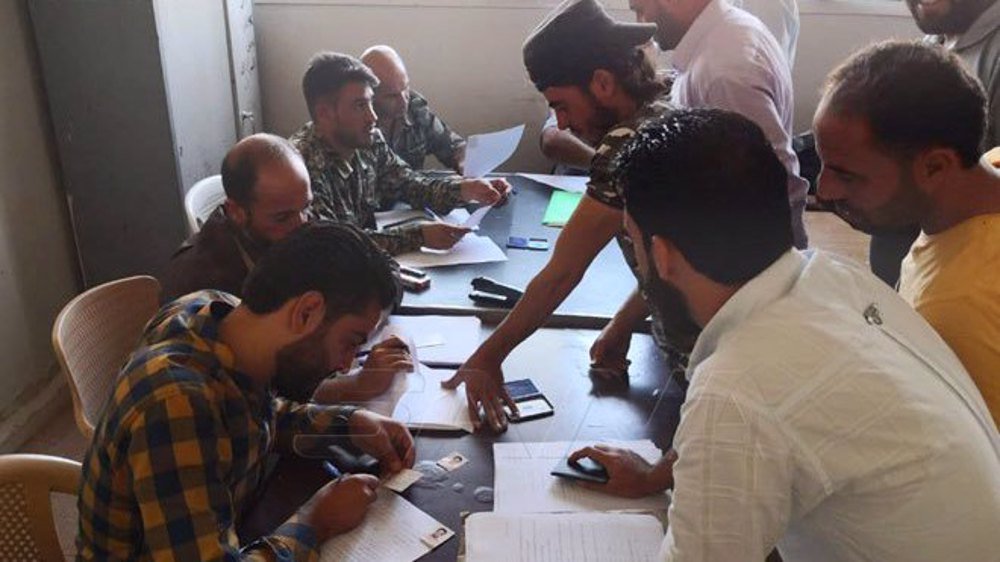
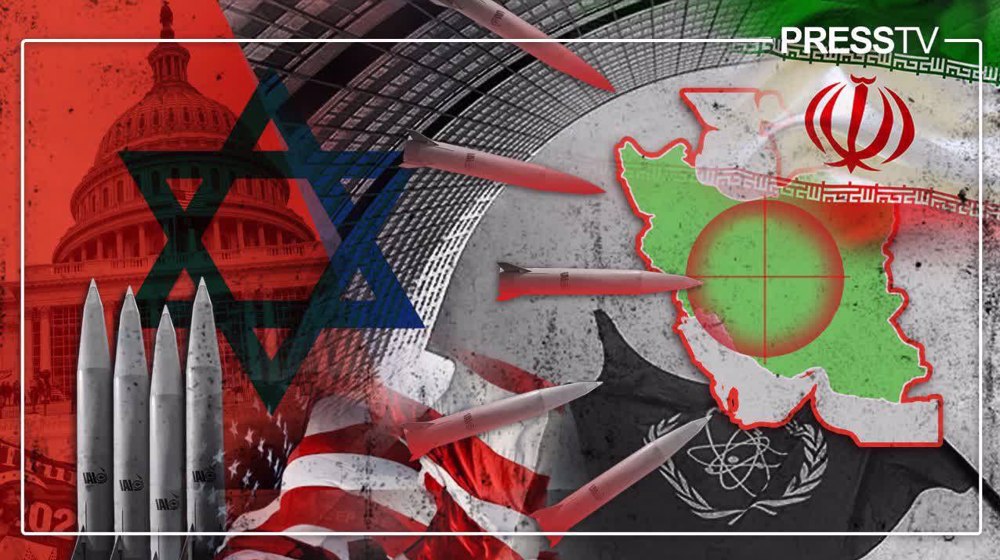

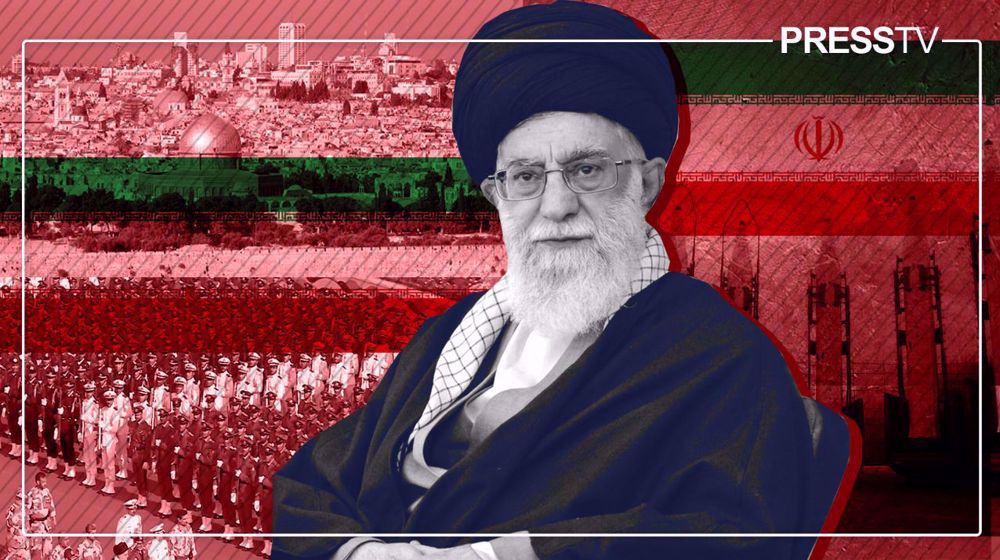




 This makes it easy to access the Press TV website
This makes it easy to access the Press TV website